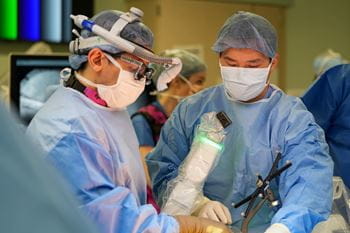Spine surgeons in the Department of Neurological Surgery at Indiana University School of Medicine are dedicated to providing both non-surgical and surgical treatment options for patients. As neurosurgeons, these faculty spine specialists have a unique understanding of how the bones of the spinal column not only support the back but also protect the delicate, innervated spinal cord. They have a deep knowledge of the interconnections among the many nerves and the roles nerves play when problems with movement and pain arise. With acute insight to how the spine and the brain work together, these surgeon educators bring clinical expertise of diagnosing and treating disorders and deformities of the spine to teaching environments for the benefit of future physicians and patients. Plus, as national leaders and teachers in Image Guidance, these faculty surgeons were among the first groups in the United States to pioneer the use of the STEALTH/ISO-C system for cervical, thoracic and spine surgeries.
Robotic Technology
The Mazor is a spinal surgery robot that helps spinal surgeons perform the most complicated of surgeries with the utmost precision and accuracy. The Mazor acts like a GPS system, guiding the surgeons inside the body to exactly where they need to go. The robot assists in image guidance and screw placement for spine surgeries. Once it finds the right spot, the team uses the robot to insert the screw into the spine. The end result is that patients benefit from minimally invasive surgery that is safer and less risky than it would be without these technological advances.
AI Technology
Artificial intelligence (AI) is changing spine surgery, and neurosurgeons at IU are at the forefront of this new technology. Surgeons in the department use UNiD rods from Medtronic for some of the most complex spinal procedures. Following a surgical plan, the UNiD rods are designed for the specific needs of a patient and industrially fabricated to accurately match an AI-driven pre-operative surgical plan, rather than the surgeon manually bending the rod in typical spine procedures. This advanced technology has helped IU surgeons achieve the desired alignment for the spine, which can provide better outcomes to patients and their families.








